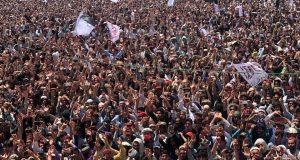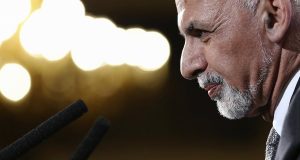BY BABAR SATTAR: Manzoor Pashteen’s social consciousness may be rooted in his Pashtun identity. He may be motivated by sufferings of fellow Pushtun’s he has seen growing up. But the questions he is asking are relevant for all of us. The debate triggered by Pashtun Tahafuz Movement is about the coercive relationship between a citizen and Pakistani state and the character, priorities and actions of our state that are undermining three foundational rights of citizens upon which is built the edifice of the rest of their rights i.e. their rights to life/liberty, dignity and equality.
Some are busy demonizing Pashteen and PTM as foreign agents. Others are busy building him up as a demigod. Pashteen and fellow PTM leaders are remarkable young men, still uncorrupted by age and experience, raising basic questions of state’s responsibility to citizens and whether our state and its power elites have made choices and pursued policies that are in our best interest. If it weren’t for them and the fact that their message is resonating with Pakistanis, there is much else around us leading to the conclusion that we are a people with dead souls.
It has taken decades of war and violence in our midst for a peace movement to erupt. We saw millions march in New York and London to oppose Afghanistan and Iraq wars almost instantly after the US-led alliance decided to wage them. Those opposed to those misconceived wars (that have led to proliferation of violence across the world) weren’t labeled enemy agents. The questions PTM is asking are thorny for a state not used to any accountability. But our state’s response to PTM reinforces the urgent need to ask those questions.
What kind of people would we be if we didn’t feel the need to pin responsibility for the loss of thousands of citizens and soldiers consumed by fires of bigotry, hate and violence that have been raging across Pakistan? Or if we didn’t ask what led to creation of monsters amongst us that has made our military war-hardened fighting within its own borders? Or if we weren’t aghast at means employed to fight this war while seeing our pilots use our planes to drop our bombs in our own territory?
It doesn’t matter that PTM is framed in ethnic Pashtun identity. PTM could very well stand for Pakistan Tahafuz Movement, for peace is indivisible. PTM mustn’t also be reduced to a Pashtun vs. Punjabi conversation or one about ratios of Pashtun representation across power elites or role of Pashtun’s in shaping and executing policies that PTM is questioning. This is a conversation initiated by those worst hit by bogus policy choices of a state that refuses introspection.
Can we reconcile Article 247 with the promise in Article 25 of our Constitution that all citizens are equal? Can Fata residents be called full and equal citizens when our Constitution reduces Fata to a colony, denying it self-governance and excluding jurisdiction of courts available to the rest of us to enforce our basic rights? No matter how bad Karachi got, would the spectacle of F-16s target bombing bad neighborhoods be fathomable? What does it say about a state that conceives and treats its citizens (even if only the worst of them) as POWs?
Enforced disappearances aren’t a Pashtun-specific issue even if Pashtuns are worst affected. A state that insists on making some citizens go missing as the only way to protect others or determines arbitrarily without due process whose right to life/liberty is to be protected and whose right can be dispensed creates the anti-thesis of a rule of law society. That many amongst us believe that such rights are luxuries that can be denied to citizens for bad behavior shows how militarized our mindset is.
We are investing in safe city projects setting up CCTV cameras across cities to balance needs of security against citizens’ right to dignity and convenience. Can one imagine everyone (everyone!) queuing up at check posts across Islamabad or cantonments with CNIC in hand and being body searched on the way to work everyday? Security agencies in parts of Pakistan where elites live are at best behavior. Why? We won’t have it any other way. Our Article 14 rights (to dignity and privacy) matter. Fata? Well, ground realities, necessities of war…
Our lack of empathy toward fellow citizens that the state power structures oppress (for being at the bottom of the power pyramid or at fringes of society due to gender, ethnic or religious identities or economic station) reminds one of chilling scene from the movie ‘A time to Kill’ where Matthew McConaughey makes a speech to a jury while defending Samuel Jackson for murder of white men who raped Jackson’s 8-year old daughter. He asks this white jury to close their eyes and imagine the events:
“This is a story about a little girl walking home from the grocery store one sunny afternoon. I want you to picture this little girl. Suddenly a truck races up. Two men jump out and grab her. They drag her into a nearby field and they tie her up and they rip her clothes from her body. Now they climb on… And when they’re done, after they’ve killed her tiny womb, murdered any chance for her to bear children, to have life beyond her own, they decided to use her for target practice.
“They start throwin’ full beer cans at her. They throw them so hard that it tears the flesh all the way to her bones. Then they urinate on her. Now comes the hanging. They have a rope. They tie a noose. The hanging branch isn’t strong enough. It snaps and she falls back to the earth. So they pick her up, throw her in the back of the truck and drive out to Foggy Creek Bridge. Pitch her over the edge.
“She drops some thirty feet down to the creek bottom below. Can you see her? Her raped, beaten, broken body soaked in their urine, soaked in her blood, left to die. Can you see her? I want you to picture that little girl…Now imagine she’s white.”
It’s interesting how the perspective changes entirely if you can relate to a victim. We did when APS happened because it could be our kids. If we can’t empathize with citizens whose lives have been consumed by violence, who have lost family members to terrorists or IEDs or have had loved ones gone missing, homes and property lost, we must know that we are losing our hearts and soul. Here we are, hearing harrowing stories that we know deep down are not made up, and yet we remain stone faced, calling them enemy propaganda.
Why is our state so insecure that it must deny agency to citizens raising critical voices by ‘otherising’ and placing them in enemy camp? There is a pattern here. The last time ordinary people came out to demand collective rights was the lawyers’ movement. It was also demonized as western sponsored/funded. The questions PTM is asking about our security policies (and chants of its more angry members) in the backdrop of how they affect citizens might make RAW or NDS glad. Is that a legitimate basis for our state to refuse to engage or introspect?
Tujhko kitno ka lahu chahiye ay arz-e-watan (blood of how many do you want, my dear nation), Faiz had asked. Those in our security establishment trying to paint the demand for a conversation about the merit and wisdom of our security policies as a mark of disrespect to Shuhuda are making a false argument. We are in eternal debt to those who sacrifice their lives to make the rest safer. But these soldiers are from amongst us. They are our family. They are our friends. When they go out to serve we don’t know if we’ll see them again.
Can policymakers hide behind sacrifices of soldiers to shun accountability for bad policies? If we are reaping bitter fruit of decades-old misconceived policies and our soldiers have had to sacrifice their lives to save citizens from their dastardly consequences, this conversation is about how not to find ourselves in such place again. The need for the state to take off its blinkers and reimagine and realign our national interest with the rights and interests of citizens is much overdue.
The writer is a lawyer based in Islamabad.
Email: sattar@post.harvard.edu
 Pashtun Times Latest News
Pashtun Times Latest News




